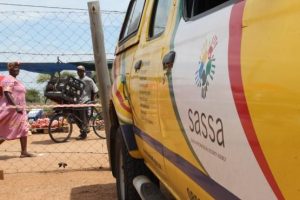- home Home
- keyboard_arrow_right CURRENT AFFAIRS
- keyboard_arrow_right Posts
- keyboard_arrow_rightCoP25 puts Paris Agreement at risk of being even more toothless
CoP25 puts Paris Agreement at risk of being even more toothless
By Tunicia Phillips
As floods ravaged through parts of South Africa’s economic hubs and mop-up operations began in Kwa – Zulu Natal after a tornado hit the south coast, South Africa’s environment minister, Barbara Creecy landed in a bustling Madrid, Spain to lead a continental fight for renewed support to address the impact of global warming at the Conference of the Parties (CoP) 25. As my daily off – record update on the state of the negotiations put it: Creecy – and the rest of the South African stakeholders; including myself, were lucky enough to also escape rotational power cuts back home as coal-dependent state power utility Eskom was forced to shed around 6000 gigawatts of energy to the system or risk a blackout.
The minister who was appointed to cabinet to head the environment ministry in May of 2019, assumed the role of President to the African Ministers Conference on the Environment [AMCEN] accompanied with the view that her team of experienced and well – respected negotiators would serve as a memorable bridge when uncompromising read-line positions became standoffs that are hard to crack. For developing countries the position is simple: big developed economies are the biggest carbon (CO2) emitters, therefore contributing the most significantly to climate change and furthermore, most liable for the loss and damage that developing nations are footing the bill for.
Creecy’s optimism was matched with credible corridor – comments that indicated a ‘historically smooth’ 1st week at the UN conference. But, as any CoP veteran would tell you, it was too soon to tell. She addressed media on a Sunday afternoon after the AMCEN held a closed meeting on its position at the negotiations.
“We have reiterated the special circumstances which our continent faces, including both our history of colonialism and underdevelopment and our current reality of unemployment, inequality, poverty, infrastructure backlogs and indebtedness.
“Our continent is already facing widespread impacts of climate change that in many countries are diverting revenue,” she added.

Minister Creecy started her week off on a high, announcing South Africa’s renewed commitment to revising and increasing its ambitions to cut carbon emissions. She echoed President Cyril Ramaphosa’s statement to the United Nations Climate Summit in September where he said that this will be done following a consultative process.
“South Africa is committed to fulfilling and enhancing our NDC following a participatory and inclusive process in the country.
“As part of this effort, our Carbon Tax Act came into effect on 1 June this year.
“Additionally, comprehensive Climate Change legislation is in the pipeline.
“Our effort is beginning to bear fruit,” she said.
I spoke to her after she launched South Africa’s fossil fuel giants, Exxaro and Sasol – sponsored pavilion. A telling sign of the disconnect between the climate emergency and the country’s commitment to keeping fossil fuel companies in business. Over 90% of Sasol’s emissions and pollution are at its South African operations where it also processes Mozambique’s gas. Creecy did not shy away from moving the buck and affirming the reality that the energy plans for SA fell within the ambit of the energy ministry. This begs the question, why are so few energy ministers in attendance at CoP?
“The task of transitioning to a low carbon trajectory is not the task of the department of environment it is the task of government and society as a whole.
“This is why our jobs summit took a decision to ensure a just transition, because as we transition it is very important that we don’t leave anyone behind,” she said.
Closed-door government negotiations in the IFEMA conference centre ran parallel to civil society demonstrations described as an unprecedented crackdown by security officials on dissenting voices. Scores gathered to lambaste the lack of radical action to address the climate emergency. The UNFCC (United Nations office For Climate Change) security found itself in a tense standoff with activists and indigenous groups from around the globe occupying the halls where closed-door discussions were deadlocking to the sound of loud chanting and scuffles.
Young activists and organisers for #FridaysForFuture were the first to take the lead in voicing their dissent when they occupied the main hall’s stage to protest against the growing reluctance to increase ambitions to cut emissions and finance.
Ugandan youth climate activist Hilda Flavia Nakabuye delivered an emotional plea for the marathon talking to stop and meaningful action to begin.
“I am the voice of the dying children, displaced women and people suffering at the hands of a climate crisis created by rich countries.
“Voices from the global south deserves to be heard.
“We are humans who do not deserve to suffer a crisis that we did not create.
“The British named my country the Pearl of Africa and I have been dreaming of seeing the meaning of this, but every day that passes our rain forests are cleared, clean air polluted and wildlife attacked.
“Climate injustice made me risk my education to fight for everyone, I would rather fail my exams than fail my generation,” she said.
A noticeably tear-filled activist concluded saying:
“For how long will you keep negotiating, you’ve been negotiating for the last 25 years, even before I was born.”
By mid-week optimism was down and Creecy joined New Zealand’s Climate Minister James Shaw to lead efforts to find that middle ground she was hoping her delegation would be remembered for. South Africa is recognised as having assisted when the Paris Agreement’s parties were failing to reach consensus.
At this point, the subsidiary body on implementation (SBI) for Article 6 (carbon markets) had collapsed and were now moved to CoP level where the two were appointed to find a solution. The ministers were seen together for the rest of the week as they hastily walked through the halls to lead formal and informal consultations over countries like Australia and Brazil pushing to among other things, carry all old carbon certificates from the Kyoto Protocol (which expires on December 31) over into the new convention under the Paris Agreement.
Nationally Determined Contributions – to carbon emission cuts (NDC’s) are at the heart of the contentious carbon market – which seeks to monetise carbon emissions by allowing big polluters to offset their emissions by investing in green projects in developing economies. The carbon market talks deadlocked over conflicting views on numerous issues relating to the technicalities of how this market will work under the Paris Agreement set to enter force at the end of 2020. Among those technicalities was Brazil’s delegation reportedly maintaining that an emission cut credit should count for both the developing country receiving the green finance for its project and the developed country financing the project to offset its emissions elsewhere in the world. This, many least developing countries argued, rendered the carbon market pointless since two countries would fulfil their NDC commitments through just one mitigation or adaptation project. On the other hand, the existing carbon market is filled with old certificates (which count towards countries recognised contributions in emission cuts), that have deteriorated significantly in value since a price was put on greenhouse gas.
Back home, wet coal – ironically as a result of heavy rainfall, and sabotage – took the blame for South Africa’s primarily fossil-fuelled power grid failing to provide enough electricity to its customers while a reluctant government ignored expert calls to sign off on a new round of agreements to procure renewable energy in spite of Eskom’s precarious balance sheet. A recently gazetted energy master plan puts coal as the primary source of energy in the country well up to 2030 when the earth is expected to reach another global warming tipping point.
Cape Town University Researcher on Energy Systems Jesse Burton described stage 6 load-shedding as an unprecedented crisis in post-apartheid South Africa when commenting on the sidelines of the conference.
“It means 14 to 16 Gigawatts of the energy system are not functioning out of 37 G/watts.
“The solutions are already known, when Minister Gwede Mantashe (a former mining unionist) release the integrated resource plan for energy two months ago it was already clear that we would have a 2-3-gigawatt shortfall between now and 2025.
“The solution is not to run the diesel turbines flat out, the solutions is to procure renewable energy capacity immediately.
“The advantage is that renewables can be connected to the grid very easily and they should cost us very little.
“Mantashe needs to also lift the restrictions for household and businesses to supply electricity to themselves, especially from rooftop solar which he has made very difficult,” she said.
By Friday briefings were frequently pushed forward and, true to the culture of the process, countries began to take reporters into their confidence in a bid to expose those believed to be regressing on previous CoP successes. It was becoming clear that attendees were in for a marathon stalemate. The African Group of Negotiators (AGN) addressed media to announce that they were prepared to extend the negotiations to another year as opposed to agreeing to positions that did not work for the continent.
“We are very worried about the balance of the outcome.
“We are seeing regressing (sic) on implementing all the commitments under the Paris Agreement,” said Ambassador Mohamed Nasr, outgoing chair of for the AGN.
“No deal is better than a bad deal for our people.
“Yes, we can continue our negotiations into next year, if it takes us there on the issue of markets.
“Africa has never been a very strong supporter of markets but we see there is potential there.
“For us, markets are a complementary process to national actions and activities, we always saw markets as a way to provide more finance for sustainable development and allow for the implementation of the conditional NDC’s,” he said.
Ambassador Seyni Nafo said that Africa had very strong positions on their demands for an increase in adaptation finance, mechanisms for loss and damage funding as well as enhancing mitigation.
“As soon as we get to finance we start playing tennis and ping pong.
“We have ambition, we have committed to the Paris Agreement but we are told that there is not enough finance.
“We have been extremely progressive in Paris, we all have NDC’s, 53 countries have ratified their NDC’s so we are serious and we mean business.
“We are ready to implement our ambitions and we are ready to talk about the real means to ambitions.
“We are not begging here,” he went on to say.
“We have a very sophisticated and complex position when it comes to mobilising finance,” he said.
Despite all attempts to resolve the unfinished business of previous CoPs after the landmark 2015 Paris Agreement, CoP 25 ended with overwhelming uncertainty. Environmental rights group 350.org blamed political leaders for failing the developing world. Kenya based Robert Mogori said that the fossil fuel industry came out of the conference victorious.
“It is pretty disturbing for us that even with all the science that is coming through regarding how badly we are doing as a planet, there’s no chance that we are actually going to achieve what we set out to achieve.
“Big polluters and big economies are not giving adaptation financing to African countries, they are not taking a keen interest in emission cuts and also the loss and damage finance is not being done.
“This for me is just being selfish, big companies want to profit even more of the loss and damage experienced in the developing world.
“We know that fossil fuels are a dying industry, renewable energy is the future – but they want to take advantage of what they have right now because they know they have a limited time before fossil fuels become extinct,” he said.
Africa is estimated to contribute only 2 – 3% of global Green House Gas (GHG) emissions but the effects of climate change are already devastating for one of the fastest-growing populations on the planet. This is why the failure of CoP25 to deliver on new financial commitments towards adaptation and mitigation; as well as losses and damage for developing economies, is a gamble with millions of lives.
The CoP 25 failures put the launch of the Paris Agreement on a weak footing next year and will see CoP 26 in Glasgow, Scotland tasked with the responsibility of resolving this stalemate in motivation to meaningfully act on the overwhelming body of scientific evidence pointing to the fact that, even the Paris Agreement’s targets may not be adequate to prevent further destruction of life on earth as we know it, post-2030. It also means that the Paris Agreement takes effect next year under a cloud of uncertainty.
Written by: Kayafm Digital
Africa Climate Change Barbara Creesy Climate change Climate Crisis COP25
Similar posts
MORE ARTICLES

SA Lotto + Lotto Plus Results for tonight: Wednesday, 02 July 2025

WATCH: Actress, Noxolo Dlamini on starring in the Sarafina play & testing moments as a creative

WATCH: Standard Bank Young Artist Award Winner Modise Sekgothe on Kaya 959 for Youth Week Takeover

Elsa Majimbo on how much she misses living in SA – ‘I miss everything, even the crime’

WATCH: Standard Bank Young Artist Award Winner Muneyi on Kaya 959 for Youth Week Takeover
QUICK LINKS
UpComing Shows

The Best T in the City
With T Bose
He has held it down in the world of mid-morning radio with the best music, riveting topics, brilliant mixes and interesting guests. Every weekday, The Best T proves why he is the BEST by connecting to you like only your bro or favourite uncle could. He lets his listeners dictate the songs they want to hear in the ever-popular Top 10 at 10, and his Three Teaspoons never run out. Catch The Best T in the City Mondays to Fridays from 09h00 to 12h00.
close
Feel Good
With Andy Maqondwana
Feel good about feeling good! That's exactly what The Feel-Good show is about. An escape from the negativity that surrounds us, indulging you in good feels. Pass it on to one and all. Spread the good feeling around Gauteng with Andy Maqondwana.
close
Kaya Biz
With Gugulethu Mfuphi
The world of business is simplified for you by Kaya Biz with Gugulethu Mfuphi. This fast-paced award-winning business show talks to the corporate giants as well as up and coming entrepreneurs about their wins and challenges. Gugulethu invites guests to offer their analyses of markets and economies, and also delves into issues of personal financial wellness. Kaya Biz airs Mondays to Thursdays 18h00 to 19h00.
close
Point of View
With Phemelo Motene
Point of View with Phemelo Motene delves into the day’s current affairs, touches on real issues that affect people’s daily lives and shares expert advice on questions posed by the audience. Mondays to Thursdays 20:00 to 22:00.
close
959 Music Weekdays
Kaya 959 Hits
Real. Familiar. Memorable. Kaya 959 brings you the music you know and love from our playlist. Uninterrupted. Thursdays 20h00 to 21h00
closeConnect with Kaya 959
DownLoad Our Mobile App
© 2025 Kaya 959 | On The Street On The Air










